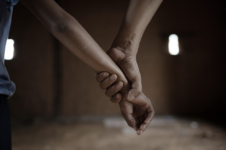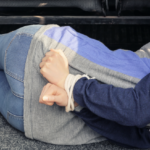The Criminal Offence of Human Trafficking

Right from under the noses of the British Home Office, hundreds of child refugees, seeking asylum in the United Kingdom, are being abducted and trafficked for all sorts of reasons.
The British Home Office has been repeatedly cautioned by a multitude of agencies, about the dangers such vulnerable children faced, arriving unaccompanied from their homelands.
Precise numbers are being quoted of children kidnapped from British taxpayer funded accommodation, which in the UK is initially 2 weeks in hotels, before being triaged by the British welfare system.
This was confirmed by Britain’s freedom of information data, which states that children spend on average 16.5 days in hotel accommodation, prior to being farmed out to welfare services across the country.
A 2021 report, by think-tank, Social Market Foundation on foster care, found there will be a shortfall of 25,000 foster families over the next few years.
Whistleblower alerts the world to Britain’s shame
An employee from Mitie, a British Home Office contractor, which is a leading facilities management and professional services provider, turned whistle-blower to alert the world to what was happening in Britain.
Statistics thus far, are that 222 children have been literally taken off the streets, with one Brighton Hotel having had 79 child asylum seekers abducted, without trace.
A Hythe Kent hotel sees 10% of their children disappear on a weekly basis, according to the whistle-blower.
According to human rights organisations, the children are being relocated to other cities and countries, such as Manchester and Scotland. Perhaps, even other countries.
Recently, Yvette Cooper, shadow home secretary baulked at the Government’s Home Secretary, Suella Braverman’s comment that robust safeguards are in place for the children.
It is further alleged that Ms Braverman did not heed warnings of the cogent risks in relation to the children.
One of the towns, Brighton and Hove City Council, alerted to children going missing from its hotels are endeavouring to locate the children, but are finding it difficult.
One Sussex Hotel had 600 children staying at the hotel in the past 18 months, with 136 having gone missing, allegedly kidnapped for human trafficking and modern day slavery purposes.
The UK Government finally confirms 200 plus child asylum seekers are missing
Immigration Minister, Robert Jenrick recently told Parliament that more than 200 children, including teenagers under 18 years of age had disappeared from Government-funded accommodation.
Initially 440 children went missing, with the outstanding 200 plus still missing, comprising 88% being Albanian, with the remaining 12% from Afghanistan, Egypt, India, Vietnam, Pakistan and Turkey.
Scotland’s First Minister, Nicola Sturgeon called for greater humanity in the UK Government’s approach to Immigration.
The Minister stated that the majority were boys from Albania, however there was one female.
Shadow Home Secretary, Yvette Cooper, accused the Government of a total dereliction of duty that is putting children at risk.
The British government advancing absurd defences – not accepted by England’s commissioner for children:
Despite the Immigration Minister stating that there were nurses, social workers and security guards in all asylum seekers hotels to ensure the safety of the children; England’s Commissioner for children, Rachel de Souza, stated that once again children missing from government approved accommodation has highlighted the vulnerability of children at the hands of those who would exploit them, in this case, human traffickers.
Death awaits children in the English Channel practically every day
45,000 tried to cross the English Channel, many in small boats, to seek asylum in Britain in 2022, with some drowning.
Mid-December 2022 saw 4 Afghan and Senegalese men drown in freezing English Channel waters.
This is just over a year ago from when 31 people drowned trying to reach Britain in a dinghy, though some reports suggest there were several survivors.
3 of the 31 were a 5-year-old girl and her teenage siblings.
Tim Naor Hilton, Chief Executive of Refugee Action said that the Government has learned nothing from the late 2021 tragedy, with more dying in 2022.
100 charities lobby Britain’s prime minister
The charities, including the Children’s Society, have claimed that the Home Office strategy of housing unaccompanied child asylum seekers in hotels is unlawful and harmful; stating it is a significant departure from the established standards of the Children’s Act 1989.
The Chief Executive Officer of the Refugee Council, Enver Solomon said it was a child protection scandal which must be addressed immediately.
How is the plight of the missing children being addressed?
Not very well, appears to be the short answer.
In reply to the Government’s response that it might not be as drastic as has been reported, Northern Ireland’s Shadow Secretary recently recounted, after personally investigating, how Sussex police intercepted a car and freed three child asylum seekers, whilst arresting two men, one of which was a gang leader and alleging human trafficking.
Opposition members of Parliament are up in arms about the apparent lack of concern about traffickers working in Britain’s backyard.
Global human rights organisations condemn British government
This is supported by all of the children’s charities and human rights organisations, not only in the UK, but all over the world, including the United Nations High Commissioner for Refugees (UNHCR).
United Nations Children’s Fund (UNICEF) UK mission states that they are there for every child, however, in the case of the missing child asylum seekers, UNICEF require the collaboration of the UK Government; which appears from comments by Government MPs, is in denial of the gravity of the situation.
Past fiasco in British politics appears to still be in vogue
With the recent political upheaval in British politics and particularly in the immigration arena, with the government already under pressure being unable to stop the boats from arriving and the overcrowding and diphtheria outbreak in the Manston Kent asylum seeker centre, the solving of this new and present dilemma appears problematic.
Add to this the massive shortage of thousands of foster families and the vulnerability of the children, which further compounds the seriousness of the situation.
Complexity of proposed reforms
The British Prime Minister, Rishi Sunak has pledged to bring in legislation this year to unambiguously make clear that if you enter the UK illegally, you will not be permitted to remain.
Further, collaboration with France to increase patrols to discourage attempts to cross the English Channel, the fourth such effort to deal with stopping or at least reducing the boats has been agreed upon, with improved technology provided to detect boats endeavouring to prepare for a trip.
The Home Secretary promises to change the modern slavery legislation, all with the end game, amongst other aspects, of preventing precisely what is happening right now in relation to the missing and potentially trafficked child asylum seekers.
In addition, the prime minister has commenced implementation of a 5-point immigration plan, which includes a £700 million small boats operational command centre and a commitment to stop using hotels, doubling asylum caseworkers and entering a new deal with Albania to encourage Albanians to return to their own country.
In an interesting questions as to why there were so many Albanian citizens seeking asylum in the UK, Qirjako Qirko, Albanian ambassador to the UK stated that some come to seek out business opportunities, whilst others pretended to be victims of modern slavery.
Perhaps the 5th point is to somehow find 25,000 Foster families, imperative to the overall plan, as outlined by UNICEF.
In reality though, it is a focus on enforcement.
In the meantime, the UK Government must throw as many investigative powers as possible from within the UK and wherever it can and find the missing children supposed to be in Britain’s safekeeping.
At the same time, Suella Braverman, the Home Secretary says she wants to be able to deport those who exploit the vulnerable children, by bringing in amended or new legislation.
Former prime minister, Theresa May, suggested that changing the modern slavery legislation may throw up some unwanted loopholes in the flagship legislation, initially introduced by the former prime minister, herself.
British office for national statistics
This department suggests that no single statistic adequately quantifies child trafficking in the UK, however, a compilation from a range of organisations may go close.
The National referral mechanism (NRM) showed that in December 2021 5468 children were trafficked. Or, at least reported by first responders, a prerequisite for investigation by the NRM. This, however, only covers England and Wales.
Scotland, between January 2019 and February 2022, via the Scottish Guardianship Service run by Aberlour, which supports unaccompanied children who arrive in Scotland, referred 147 cases of potential child trafficking matters to the NRM.
Northern Ireland referred 128 cases to the NRM, an increase of 750. % since 2012
The reasons that England and Wales report statistics as one entity to the NRM, is that in Britain there are three distinct legal jurisdictions, England & Wales, Northern Ireland and Scotland, with each retaining its own history, origins and legal system.
This is something which goes back in history.
Notwithstanding that each has some aspects of autonomy, by reason of devolution – by virtue of the Welsh Senedd, the Scottish Parliament and the Northern Ireland Assembly.
One can perhaps now seem to understand why statistics are difficult to find a common-sense degree of accuracy, although perhaps those independent figures from the three country entities, make up the UK office of statistics range of organisations, which give us as close to an accurate estimate as is possible, in relation to child trafficking in the UK.
The NRM stated that 62% were boys who were criminally exploited and 42% were girls who were sexually exploited.
82% were aged 15 to 17 years.
The NRM was introduced in 2009, as a template for identifying, referring and supporting victims of modern slavery and human trafficking in the UK, after the UK Government ratified the Council of Europe Convention on Action against Trafficking in Human Beings.
However, it has its critics in many human rights organisations, which strongly rejects that it is an effective body and state that it is not fit for purpose; in particular, the global anti-trafficking monitoring group (ATMG), which is rather scathing in some aspects of its critique.
Under our noses
But focusing on children being trafficked today in Great Britain, where in 2023, kids are at this very moment being abused in every evil way possible, under the care of what was once termed the British Empire and still called Great Britain.
How on earth can this be happening?
Parliamentary question time 2023
On 26 January 2023, just the other day, the UK prime minister, Rishi Sunak, in responding to a question about whether he thought the UK was a safe haven for vulnerable child asylum seekers, finally confirmed that the missing children were concerning and that is why we must cease using hotels as temporary accommodation where we can.
The world opinion is that it will take much more than ceasing the use of hotels as temporary accommodation to protect our most vulnerable human beings, the children of the world.
The problem perists and the children are still missing this very day.
Human trafficking is a serious criminal offence
The offence of child trafficking of children is a serious one, and generally carries a maximum penalty of life imprisonment under British legal systems.
But what about here in Australia?
The Criminal Code Act 1995 (Cth) (‘the Act’) is a piece of legislation which applies throughout the nation and contains several offences which potentially apply to the act of trafficking in persons, including of course children.
Australia offences relating to human trafficking
And while the act of trafficking in persons, and all that goes with it, can raise liability for more general crimes such as kidnapping, various assault and sexual offences, sections 270 and 271 of the Act contain offences which focus on conduct that more specifically associated with acts of human trafficking.
The main offences contained in these two sections are:
- 270.3 – Slavery – maximum penalty of 17 to 25 years in prison depending on nature of offence,
- 270.5 – Servitude – maximum of 15 to 20 years depending on the offence,
- 270.6A – Forced labour – maximum of 9 to 12 years,
- 270.7 – Deceptive recruiting – maximum of 7 years in prison,
- 270.7B – Forced marriage – maximum of 4 to 9 years in prison,
- 270.7C – Debt bondage – maximum of 4 to 7 years in prison,
- 271.2 – Trafficking in persons – maximum of 12 years in prison,
- 271.3 – Aggravated trafficking in persons – maximum of 20 years in prison,
- 271.4- Trafficking in children – maximum of 25 years in prison,
- 271.5 – Domestic trafficking in persons – maximum of 12 years in prison,
- 271.6 – Aggravated domestic trafficking in persons – maximum of 20 years in prison,
- 271.7 – Domestic trafficking in children – maximum of 25 years in prison,
- 271.7B – Organ trafficking – maximum of 12 years in prison, and
- 271.7C – Aggravated organ trafficking – maximum of 20 to 25 years in prison.
And while none of these offences carry a maximum penalty of life imprisonment, it is important to bear in mind that having sexual intercourse with a person under the age of 10 years does, and the offence can be charged in addition to the above offences where the trafficking involves such conduct.
Receive all of our articles weekly
Related Articles
RELATED LEGISLATION
- Section 270.3 Criminal Code Act 1995 | Slavery
- Section 270.5 Criminal Code Act 1995 | The Offence of Servitude
- Section 270.6A Criminal Code Act 1995 | Forced Labour
- Section 270.7 Criminal Code Act 1995 | Deceptive Recruiting for Labour or Services
- Section 270.7B Criminal Code Act 1995 | Forced Marriage
- Section 270.7C Criminal Code Act 1995 | Debt Bondage
- Section 271.2 Criminal Code Act 1995 | Trafficking in Persons
- Section 271.3 Criminal Code Act 1995 | Aggravated Trafficking in Persons
- Section 271.4 Criminal Code Act 1995 | Trafficking in Children
- Section 271.5 Criminal Code Act 1995 | Domestic Trafficking in Persons
- Section 271.7 Criminal Code Act 1995 | Domestic Trafficking in Children
- Section 271.7B Criminal Code Act 1995 | Offence of Organ Trafficking - Entry into and Exit from Australia
- Section 271.7C Criminal Code Act 1995 | Organ Trafficking - Aggravated Offence
- Section 271.6 Criminal Code Act 1995 | Domestic Trafficking in Persons - Aggravated Offence






